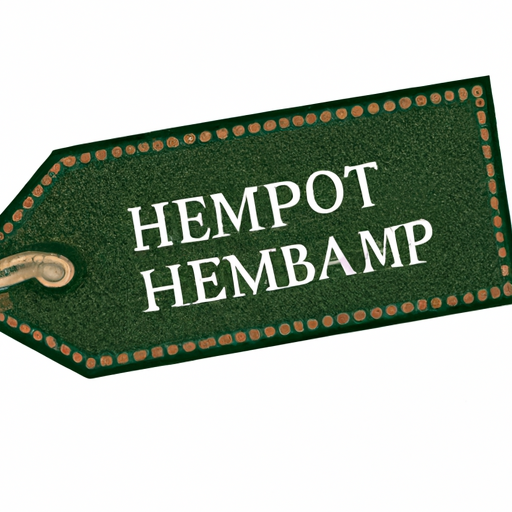With the increasing popularity and demand for hemp clothing, it becomes crucial to comprehend the export and import regulations that govern this booming industry. In this article, we will explore the various regulations and guidelines that businesses within the hemp clothing industry need to navigate in order to successfully export and import their products. By gaining a clear understanding of these regulations, you will be able to confidently engage in international trade and expand your business beyond borders.
Export Regulations for the Hemp Clothing Industry
The export regulations for the hemp clothing industry are important to understand in order to ensure smooth and legal international trade. These regulations can vary from country to country, and it is crucial to comply with them to avoid any penalties or delays in exporting hemp clothing.
Export Restrictions
Export restrictions are laws or regulations that limit or control the export of certain goods or materials. In the case of the hemp clothing industry, some countries may have restrictions on exporting hemp-related products due to the association with cannabis.
Document Requirements
When exporting hemp clothing, specific documents are required to ensure proper identification and compliance with export regulations. These documents typically include a bill of lading, commercial invoice, packing list, and a certificate of origin.
Customs Declaration
A customs declaration is a document that provides information about the goods being exported. This includes details such as the quantity, value, and description of the hemp clothing being exported. It is important to accurately fill out this declaration to avoid any customs issues.
Export Licenses
Export licenses may be required for the export of hemp clothing, depending on the laws and regulations of the exporting country. These licenses are obtained from the relevant government agency and serve as permission to legally export the products.
Export Controls
Export controls are measures put in place to regulate the export of certain goods that may have national security or strategic implications. In the hemp clothing industry, there may be export controls on items such as dual-use items (which have both civilian and military applications) or technologies that may be deemed sensitive.
Tariffs and Duties
Tariffs and duties are taxes imposed on imported or exported goods. The rates of these tariffs and duties can vary depending on the country of export and destination. It is important to understand the tariff classification and harmonized system codes for hemp clothing to accurately calculate these fees.
Trade Agreements
Trade agreements between countries can have a significant impact on the export of hemp clothing. Free trade agreements, customs unions, and bilateral agreements can reduce or eliminate tariffs, streamline customs procedures, and enhance market access for exporters in the hemp clothing industry.
Labeling and Packaging Requirements
Labeling and packaging requirements are crucial when exporting hemp clothing as they ensure compliance with regulations and provide essential information to customers. These requirements may include specific labels indicating the fiber content, care instructions, and country of origin.
Country-specific Regulations
Each country may have its own specific regulations regarding the import of hemp clothing. It is crucial to research and understand the regulations of the target country, including any prohibitions or restrictions on hemp clothing imports.
Export Compliance
Export compliance refers to the adherence to all applicable laws and regulations related to the export of hemp clothing. It is essential to follow all export regulations, obtain the necessary licenses, and correctly document and declare the goods being exported to maintain compliance and avoid penalties.
Import Regulations for the Hemp Clothing Industry
Understanding the import regulations for the hemp clothing industry is crucial for businesses involved in importing these products. Adhering to these regulations will ensure a smooth and legal import process, avoiding any complications or delays.
Import Restrictions
Import restrictions are regulations imposed by a country that limit or control the import of certain goods. When it comes to the hemp clothing industry, some countries may have restrictions on importing hemp-related products due to varying legislation regarding the use of hemp fibers.
Import Permits
Import permits are licenses or authorizations issued by the importing country’s government that grant permission for the import of specific goods. Hemp clothing importers may be required to obtain import permits to comply with the regulations of the destination country.
Customs Clearance
Customs clearance is the process by which imported goods are authorized by customs authorities to enter the country. It involves submitting the necessary documentation and paying any applicable duties or taxes. Proper customs clearance is crucial to ensure the legal importation of hemp clothing.
Import Duties and Taxes
Import duties and taxes are fees levied on imported goods by the destination country’s government. The rates of these duties and taxes can vary depending on factors such as the type of goods and the country of import. Importers must be aware of these fees and factor them into their cost calculations.
Sanitary and Phytosanitary Measures
Sanitary and phytosanitary measures are regulations put in place to protect human, animal, or plant health. In the hemp clothing industry, these measures may include inspections and certifications to ensure that the products are free from harmful substances or contaminants.
Technical Barriers to Trade
Technical barriers to trade refer to regulations or standards that can create obstacles for importers. These barriers may include product testing, certification requirements, or labeling regulations. Understanding and complying with these technical barriers is essential for importing hemp clothing.
Regulatory Compliance
Regulatory compliance in the import of hemp clothing refers to adhering to all relevant laws and regulations imposed by the destination country. This includes obtaining the necessary permits, meeting labeling requirements, and ensuring the products comply with quality and safety standards.
Labeling and Packaging Requirements
Labeling and packaging requirements for imported hemp clothing can vary from country to country. These requirements often include labeling to indicate the fiber content, care instructions, and country of origin. Compliance with these requirements is essential to avoid any penalties or rejection of the products at customs.
Intellectual Property Protection
Intellectual property protection is crucial in the hemp clothing industry to safeguard original designs and prevent counterfeiting. Importers should ensure that their products are not infringing on any trademarks, copyrights, or patents of others, both in the exporting and importing countries.
Country-specific Regulations
Just as with export regulations, import regulations for hemp clothing can vary from country to country. It is essential to research and understand the specific requirements and restrictions imposed by the destination country to ensure smooth and compliant imports.
In conclusion, understanding and complying with the export and import regulations for the hemp clothing industry are crucial for businesses in order to ensure legal and successful international trade. By familiarizing yourself with export restrictions, document requirements, customs declarations, export licenses, and export controls, you can navigate the complexities of exporting hemp clothing smoothly. Similarly, being aware of import restrictions, import permits, customs clearance, import duties and taxes, and technical barriers to trade will allow you to import hemp clothing legally and efficiently. Always stay updated on country-specific regulations and maintain export and import compliance to facilitate the growth and success of your hemp clothing business.
Recent Posts
Discover how bubble hash is rated on a 1 to 6 scale. From texture and color to aroma and potency, learn the key factors that determine the quality of bubble hash. Whether you're a seasoned cannabis...
Looking to learn about the most popular style of hash? This article explores the different types, from traditional to bubble hash, and reveals the people's favorite. Join us on a journey through the...

